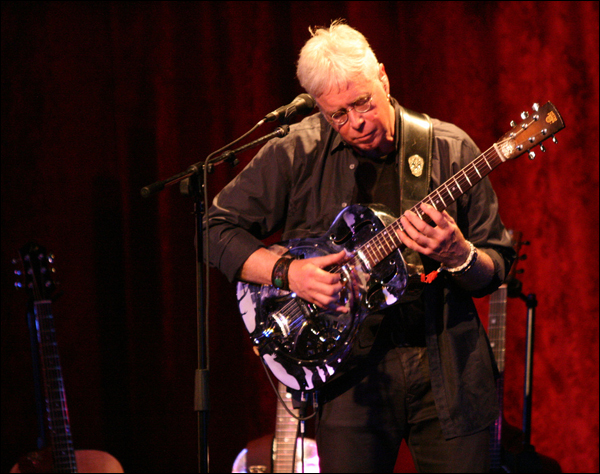
25 April 2010 -
Canadian songwriter/guitarist Bruce Cockburn's breakthrough to the U.S. market came as something of a surprise. MTV started running a video for his 1983 song, If I Had a Rocket Launcher, a tale of revolutionary anger inspired by a visit to a Guatemalan refugee camp. It caught on and became his biggest hit. While his environmental anthem, If A Tree Falls, is another with a political bent, much of the work on his 30 albums is more personal in nature. He's just as likely to write a love song or one about life on the road. (He says he "fell under the spell of Jack Kerouac at a very vulnerable point.") Right now he's assembling material for recording sessions set for June, so those who hear him perform at the Arcata Theatre Lounge can expect some road testing. When he called the Journal's Bob Doran from Santa Barbara Sunday afternoon, Cockburn was on day two of a tour of the West Coast that brings him to Arcata Friday night.

Journal: I understand you've been assembling songs for a new album, whatever that might mean.
Bruce: It may mean I'm still in the process, or it may mean I've got all the songs. I'd be happy if it was the former, but I do have a bunch of new songs, and we have plans to record in June.
Journal: Are you road testing them first?
Bruce: I like to perform them for people before I go into the studio if possible because the songs kind of mature in some way, or maybe the emotional approach to them undergoes a kind of adjusting when you perform them in front of people over a period of time. I like to have that done where possible.
Journal: Do you look at putting together an album as an assignment that's due at some specific time? I know some writers will do that and start writing when they're getting ready to record. Or is it more like you're writing songs all the time, as they come to you?
Bruce: I write whenever I think of an idea and when I'm in a situation where I can actually grab it and wrestle with it. A lot of times ideas go and go - you're in the middle of something you can't interrupt to write songs. So those sometime fall by the wayside, but I really depend on some kind of trigger to get going. I don't have an understanding of people who can sit down and turn out work on the clock like that. It doesn't work for me.
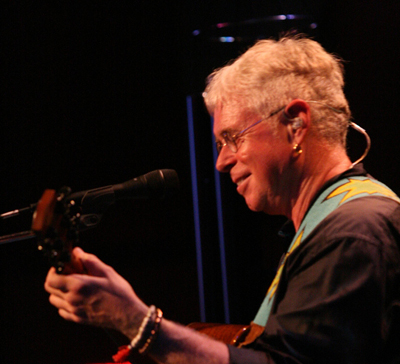 Journal: What are some things that have served as song triggers recently?
Journal: What are some things that have served as song triggers recently?
Bruce: Among the group of songs there are love songs; there's the road, which continues to figure prominently in what I'm writing.
Journal: The road?
Bruce: Not the Cormac McCarthy Road exactly, but the road, travel.
Journal: Metaphoric....
Bruce: Yes, and literally. I do a lot of long distance driving when I'm not on tour. It's how I've lived, at least for large chunks of my life. I'm much more at home on the road than / I am in a house, so that's always been a big part of things for me.
Journal: I guess as a professional musician it comes with the job.
Bruce: There's that, but it's also that I fell under the spell of Jack Kerouac at a very vulnerable point. And our family had traveled, so I learned to like it as a kid. There's a headlong rush of motion that's the feel of that book On the Road, it swept me away and I never got over it. One of the reasons I do what I do is that it includes that. I don't think I'd be all that happy as a session player, even if I was qualified.
Journal: Don't you think you're qualified? I'd say you're a pretty good picker.
Bruce: I can do what I do. I'm not being immodest. But there's a special ear and a generalized approach to playing required of a studio musician, and of course amazing chops. Most of the people I've encountered who make their living that way have better technical abilities than I do.
Journal: There's definitely a different skill in being able to sit down with just a piece of paper and be able to add something valuable to a musical conversation.
Bruce: Of course I'd love to have their abilities. If you think of the Jim Keltners and the Booker Ts, Greg Liesz, all these people who are known as studio players - they have an ability to fit. It's an enviable quality to have. That said, I don't want to live their lives. I like my life. I like where I've been able to go with the music too. There's always somewhere new to go.
Journal: Where are you going next?
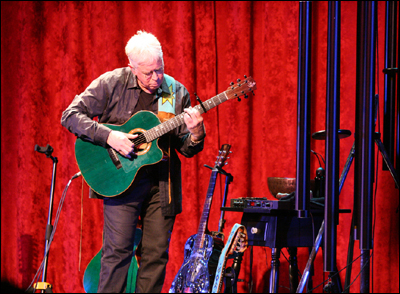 Bruce: Where am I going? I don't know. I like to keep it open. I like to experiment with things as they come up, pertinent to songs. There's a difference to my approach between instrumental music and songs. The songs are very lyric-driven. The music applied is at the service of the lyrics. In an instrumental piece that's not a consideration so the music can go where it will.
Bruce: Where am I going? I don't know. I like to keep it open. I like to experiment with things as they come up, pertinent to songs. There's a difference to my approach between instrumental music and songs. The songs are very lyric-driven. The music applied is at the service of the lyrics. In an instrumental piece that's not a consideration so the music can go where it will.
Journal: So in general, you'll write lyrics for a song and come up with music to fit them?
Bruce: Pretty much. I've used the analogy elsewhere but it fits. It's very similar to scoring a film. The imagery, the characters maybe, a theme that show up in the lyrics wants to be supported by the music but not obliterated by it. So the music is applied to the lyrics in a similar way to what you'd do scoring a film.
Journal: I'd say one of the things I like about your songs is the cinematic quality. You take the listener into a scene and introduce characters both with lyrics and the music.
Bruce: It's nice to hear that. That's how I hope it works.
Journal: When you mentioned things you're writing about -- love, the road -- you did not mention anything political. I know there are times in your career when politics played more of a role, other times when you looked inward. Where are you now?
Bruce: There's not a plan. At least no plan that I make. When I'm confronted by things that trigger a strong emotional response, they end up in songs.
Journal: Last time we talked you'd just returned from Iraq, an experience that you ended up writing about...
Bruce: You know I was in Afghanistan in the fall...
[You can read this story Bruce Visits Brother in Afghanistan]
Journal: I was going to ask about that...
Bruce:There's a song that came from that, but I don't know that it's what you'd call a political song per se. It's basically a description of what it feels like to be at a ramp ceremony. On our way into Afghanistan we stopped at a base that's a staging area for flights into Kandahar...
Journal: A ramp ceremony?
Bruce: I'll tell you what that is. In Canada, it's a familiar thing. We haven't lost the number of troops that the U.S. has, because we haven't had the numbers over there, but we've lost quite a number of people there. There has never been any attempt to suppress that information. In the States you don't hear about the people who come back as casualties, either dead or injured.
Journal: It was only recently that the American military allowed publication of photos of flag draped coffins.
Bruce: The difference is, in Canada, the term ramp ceremony is familiar because they're on TV. Every time a Canadian dies in Afghanistan, their body is repatriated to a particular air force base and the families or anyone else concerned greets the arriving deceased. The coffin comes down a ramp off the C-130 cargo plane with a flag over it and is carried off. There's a ceremony where they play a hymn, maybe 'Amazing Grace' on bagpipes. The personnel on the base will line up on the tarmac. The commanding officer will say something; maybe a religious person will say a few words. So we were at this base in the Middle East, waiting for the next flight to take us to Kandahar, and before we could leave, a plane came in with the bodies of two soldiers on it, so there was a ramp ceremony at the base. We lined up with the rest of the soldiers and it was extremely moving. It was so touching, the vibe among the soldiers, the atmosphere of respect and sobriety, the depth of feeling present. The day after I got back from the trip I wrote the song.
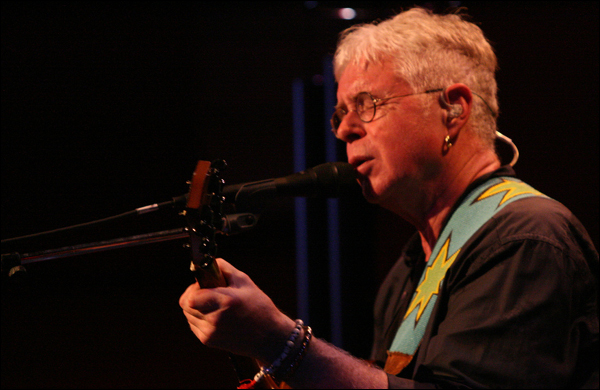 Journal: Your brother is over there?
Journal: Your brother is over there?
Bruce: He was over there at the time. He was nearing the end of a six-month tour as a doctor.
Journal: Does the fact that you're visiting him give you a different level of access?
Bruce: Maybe. It gave a personal connection aside from the going over to sing for the troops kind of thing. John would introduce me to his friends, I wasn't there long enough to make friends, but I got acquainted and had some conversations that taught me things. I think it made a difference.
Journal: So it wasn't like a USO thing...
Bruce: It was a bit like that, but that was how to get there, from the Army's point of view. John and I approached it from different angles. John, my brother, who had a career as a doctor, joined the Army a few years ago, so there was a press angle the Army was interested in.
Journal: I read somewhere that at some point while you were there someone handed you a rocket launcher.
Bruce: That actually happened on a couple of occasions, but one in particular made the papers. We went on this fantastic trip by helicopter out into several of the forward operating bases. There were a couple of other artists along beside me, so we did a show at one of these bases. We'd each play a song for the guys -- they're mostly guys on those bases, the women aren't right at the front. There they were; they appreciated us being there and showing solidarity etc. and getting a little diversion from the horrible routine. I sang If I Had a Rocket Launcher at these occasions because it seemed the appropriate thing. They, of course, had a slightly different understanding of the song from mine. It was a little more concrete for them. They got into it. So at the end, one of the military guys traveling with us came over and said, 'Don't put your guitar away just yet; hang in for a second.' He kind of backed off and I was looking at the troops applauding and grinning and I see they're grinning at something else. Next thing I know, this general, the commander of the Canadian forces in Afghanistan, popped up next to me with one of those portable single-use rocket launchers and hands it to me. The cameras were popping; it was their big press moment, you know, 'Cockburn finally gets his rocket launcher,' that was the headline. I was laughing my head off holding this thing. They took it away really fast before I could get my finger on the trigger.
Journal: Sounds pretty surreal. It's hard to know how to react.
Bruce: For me, you know I'm interested in that kind of stuff. You don't have to fit into any philosophical or social category to think that was is bad. The people who fight wars think they're bad. They think they're necessary, but nobody goes out and does it because they love it. I think there are some perverted people who do end up that way, and they include some journalists I've met, but no sensible person wants war. Whether you think about it, that it's just part of human life or whatever your reasoning, speaking only for myself, I've always been interested in military tactics, and in military gear, all that stuff, so I felt quite at home surrounded by the hardware. Of course if I'd been shot at right then, I probably would not have felt so at home at all. But the gear is interesting -- for instance, the trucks they have are the best on the planet. So being handed a rocket launcher was like being handed something I'd seen in a Clint Eastwood movie. Of course I've also seen them in other places and situations. I remember riding in the back of a truck in Mozambique, a dump truck full of people traveling from one town to another. There was a soldier standing next to me. I kept feeling something bumping the back of my head. I turned around and he had an RPG slung over his shoulder and the tip of the rocket was banging the back of my head. So, being handed a rocket launcher by a Canadian general, it was shocking, it was funny.
Journal: Another thing I read on your website is that you are about to be honored by Earth Day Canada with the Outstanding Commitment to the Environment Award.
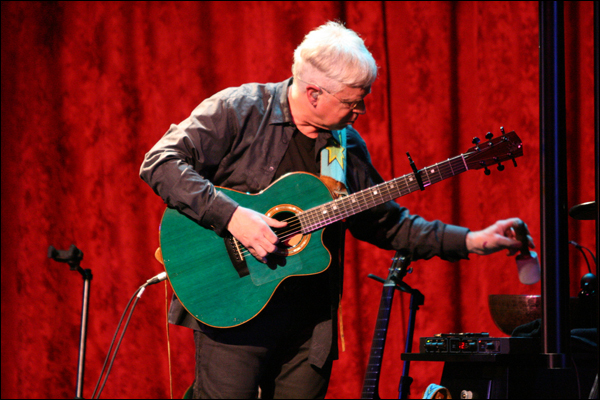 Bruce: There's no accounting for some people's vision (laughs) but it's nice to be thought of by those folks and it's nice to be able to be part of these kinds of exercises publicizing the work they do and the need for that work.
Bruce: There's no accounting for some people's vision (laughs) but it's nice to be thought of by those folks and it's nice to be able to be part of these kinds of exercises publicizing the work they do and the need for that work.
Journal: Obviously environmental issues have been an ongoing concern for you...
Bruce: They are an ongoing concern, maybe the biggest ongoing concern other than my own personal crap that I'm not going to talk about (laughs again). The environment is us. The environment is everything. And without everything working the way it's supposed to, we aren't going to do well or even do at all. Of course when you start looking at how to address environmental issues, you immediately enter the realm of politics...
Journal: And money...
Bruce: Well, money is also the realm of politics especially in North America.
Journal: They go hand in hand, which doesn't bode well for the environment...
Bruce: Or anything else, other than the ability to be able to buy the stuff we're convinced we need, the latest jeans or whatever. That's what corporate rule gives you, for now at least. Before long it will only give it to the several hundred billionaires who will live in Dubai. They'll be able to shop for what they want while the rest of us will be scrounging around in the deserts we're reduced to. Unless we really do something about environmental degradation, we're going to be in a lot of trouble, we humans. I may not be alive when the worst of it hits, but my granddaughter will be, so it matters. Of course the politics is such that you don't get anything done without somebody being willing to spend money or stop making money or refusing someone's offer of money or something. It's all on a piecemeal basis. There's no overview. The overview would be to totally change the system, but that isn't going to happen, at least not in any way I'm able to contribute to.
Journal: The system has to change so that money isn't the end-all and be-all of everything...
Bruce: I think that's an issue for the human heart, which can and should be addressed. I got into a conversation with a homeless guy on a bus not too long ago in San Francisco. He was saying, the thing that's wrong with America as he saw it, he was an older guy, roughly my age, as he saw it American had forgotten to care about each other, or how to care about each other. It's probably less true in rural areas, in fact I'm sure that's the case, but in urban America and urban anywhere else, the culture is so materialistic and self-oriented. Everything's about me and my ability to move forward, and my clothes, and how people see me. It's all that. That seems to be the prevailing ethos for society, if I can use a word like that. It's like this is what life is about. That's something we have to try to change.
Journal: I know the world's problems are huge and it may seem like just a drop in the bucket, but do you see your music, your songs as a means to bring about change?
Bruce: I think a drop in the bucket is all you can expect. I think that counts. It would be a mistake to believe that a song by itself is going to make a difference in the course of events, but a song as a rallying point for a whole bunch of people's opinion, does have that potential. It's not really the song that does it, it's the people's opinion, but a song can be an anthem for a movement or it can pull a movement together and help it to recognize itself as a movement.
Journal: On a different level, a song might just make someone aware of an issue...
Bruce: On the macro level it's about the body of popular opinion, on a micro level it's just that, you touch one person. My expression of my experience touches someone in a way they can relate to. I know from what some people have told me, that at least some people have been inspired to get involved in things because of hearing my songs. But I suspect that I just reinforced some tendency they had already.
Journal: You have a platform that allows you to point to things, perhaps making people aware that landmines are a problem in the world or that there's a growing mass of plastic floating in the Pacific, whatever it might be. Of course most entertainers are trying to distract people from their problems, to make them forget their troubles...
Bruce: Which is okay too. There's nothing wrong with that. It's a case of what you're good at and what you want. There are lots of times when people who are deeply involved in correcting the problems of the world get down and party.
Journal: I certainly have nothing against party music -- I love it -- but the artists whose music seems to resonate for me long term, are those who have something to say.
Bruce: I think what makes music interesting for me is the sense that there's something being explored. If I don't hear a sense of exploration in a piece of music, it's boring. That might be a subjective judgment on my part, and nothing has to follow any particular form, but it has to take a chance. That's what makes art interesting.
Photos and Interview by Bob Doran, used with permission.
Related Links~ bobbi wisby